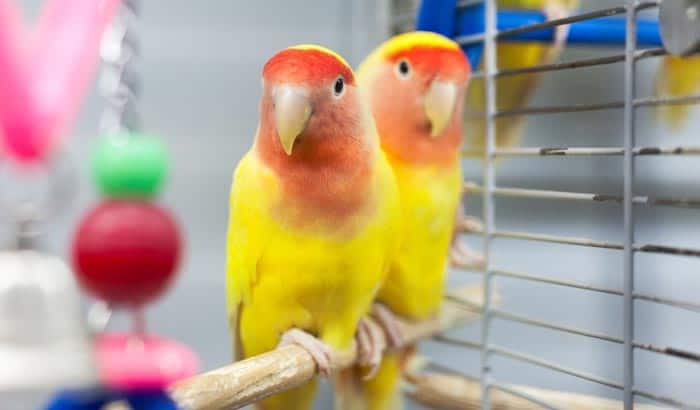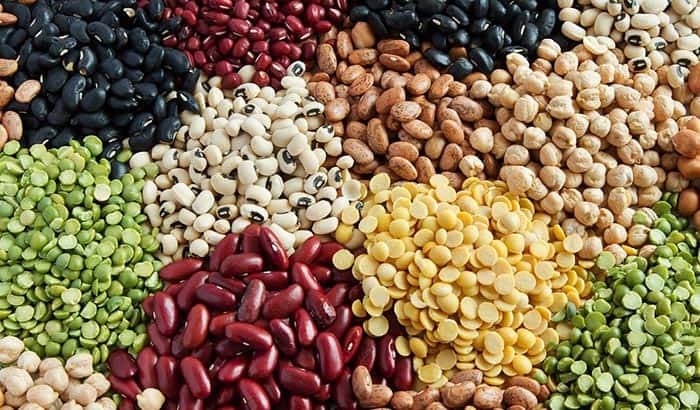Lovebirds are the common choice of bird lovers for a pet. They can keep you company for a long time because their average lifespan is 15 years. Lovebirds usually come in pairs but can also come singularly.
There are three species of lovebirds that are the usual choices for pets. These are the Fischer, the peach-faced, and the masked lovebirds. They are smaller than other pet birds since they are about 5 to 6 ½ inches long. They have stocky frames and short, rounded tail feathers.
It is not very difficult to take care of lovebirds. All they need is a spacious home and constant physical contact with their owners. Furthermore, they need to have the necessary minerals and vitamins. The most common nutrient sources for lovebirds are listed below.
Common Food for Lovebirds
Seeds and Grains
In the wild, lovebirds can choose from a variety of seeds. The seeds they consume are seasonal. Consuming assorted seeds throughout the year ensures that the lovebirds have a balanced diet.
However, lovebirds that become house pets consume about five to ten different types of seeds. Most probably, these will be agricultural seeds. Some will provide your lovebird their needed nutrients. Flax, rape, safflower, squash, soybean, fennel, poppy, sesame, and sunflower seeds are among them.
Furthermore, grains are also essential to a bird’s diet since they are a source of Omega-6. You can include rice, milo, millet, corn, and wheat grains in your bird’s diet.
Fruits
Fruits, just like seeds, are widely available in the wild. Thus, you also need to serve your lovebirds fruits. However, since fruits contain lots of sugar, they need to be given in small parts. Serve small portions of apples, grapes, kiwis, strawberries, melons, bananas, and raspberries.
Make sure that you remove the pits and seeds of the fruits that you are feeding your lovebirds. Some of these seeds and pits contain considerable amounts of a cardiac-toxic cyanide compound that may impose health hazards on your birds.
Greens and Edible Flowers
In the wild, birds get greens from small plants with tender leaves. You can provide greens for your bird by buying watercress, parsley, and sprouts in the market. Kelp and seaweed are also possible options. Wash the greens before giving them to your birds.
Lovebirds can consume certain flowers. Dandelions, carnations, and chamomile are possible additions to the birds’ diet. You can find dandelions in the backyard or neighborhood.
Before purchasing plants to feed your bird, make sure to research if they are safe for the bird. The same goes for the flowers that you may be picking from your backyard or neighborhood. Also, make sure the plants are free from chemicals.
Vegetables
Lovebirds can consume vegetables in the same portion as fruits. Vegetables provide variation in the diet of the birds. Furthermore, they provide vitamins and minerals that are not in fruits, seeds, and grains. Kale and broccoli are the most preferred vegetables by lovebirds.
Just like greens, you need to wash vegetables before giving them to your pets.
Legumes
Legumes are a great source of protein and fiber. All you need to do is boil some beans for at least 15 minutes, let it cool down, and serve some to your pets. Never feed your birds raw beans as they may be toxic.
Alfalfa sprouts are a healthy choice for your birds. Sprouts are readily available in the market. Make sure to wash them to rid of pesticides before feeding them to your pets.
Pellets
The artificial choice for bird food is pellets. They contain the necessary minerals and vitamins needed by birds. Special feeds are those that are intended for consumption by a specific group of birds. Some pellets are particularly for fledglings or for birds with diseases.
Nuts
You can serve nuts as treats or snacks. Nuts are tasty. Also, they contribute to the nutrition of the bird. Make sure that the nuts you give your lovebirds are free from dirt and salt.
Bread and Pasta
Plain wheat bread, a good source of fiber, can be a breakfast option or a snack option for your birds. Pasta is a good source of carbohydrates and can be served cooked or uncooked. Additionally, you can fill the pasta with peanut butter to add more taste to the birds’ snack.
There are also certain foods that you must not feed your lovebirds.
Foods that are dangerous for birds
Caffeine
Coffee, tea, and soft drinks are some of our favorite beverages. However, they contain caffeine that is quite dangerous for birds. When ingested by birds, it may cause arrhythmias, increased heart rate, or heart attack. Water and fruit juice are the safest drink options for your pet birds.
Chocolate
Chocolates are delicious as snacks and bread filling. However, they are harmful to birds. Chocolates may cause vomiting and diarrhea in birds. Chocolates infused with caffeine may cause tremors, seizures, and probably death.
Avocado
There are numerous avocado varieties. With so many variations, it is difficult to know which avocados are safe for birds and which ones are harmful. Poisonous avocados can cause breathing difficulties, weakness, heart damage, and even death.
Salt
Salt makes food tastier. However, salt is a potential threat to lovebirds. Bread, crackers, pretzels, and popcorns that contain salt are harmful to birds. The salt content of the mentioned foods can throw off the fluid balance of birds. Unbalanced body fluids may cause a bird’s dehydration, kidney failure, and death.
Fats
Regular consumption of fatty foods can raise cholesterol levels. Obesity and heart problems may result. Do not feed your birds deep-fried foods or fast-food meals.
Conclusion
When your birds originate from the wild, they have to adapt to their new home. Part of their adaptation is adjusting their diet depending on the availability of food and their nutritional content. Furthermore, another adjustment that they have to go through is the size of servings recommended for them.
Since you will be buying most food supplies from the supermarket, always read the labels and the serving suggestions. Vegetables, greens, and fruits must consist only 20-25 % of your birds’ diet. Do not serve them the same food every day.
On a final note, make sure your lovebirds always have enough water. Always keep the food and water containers clean.


